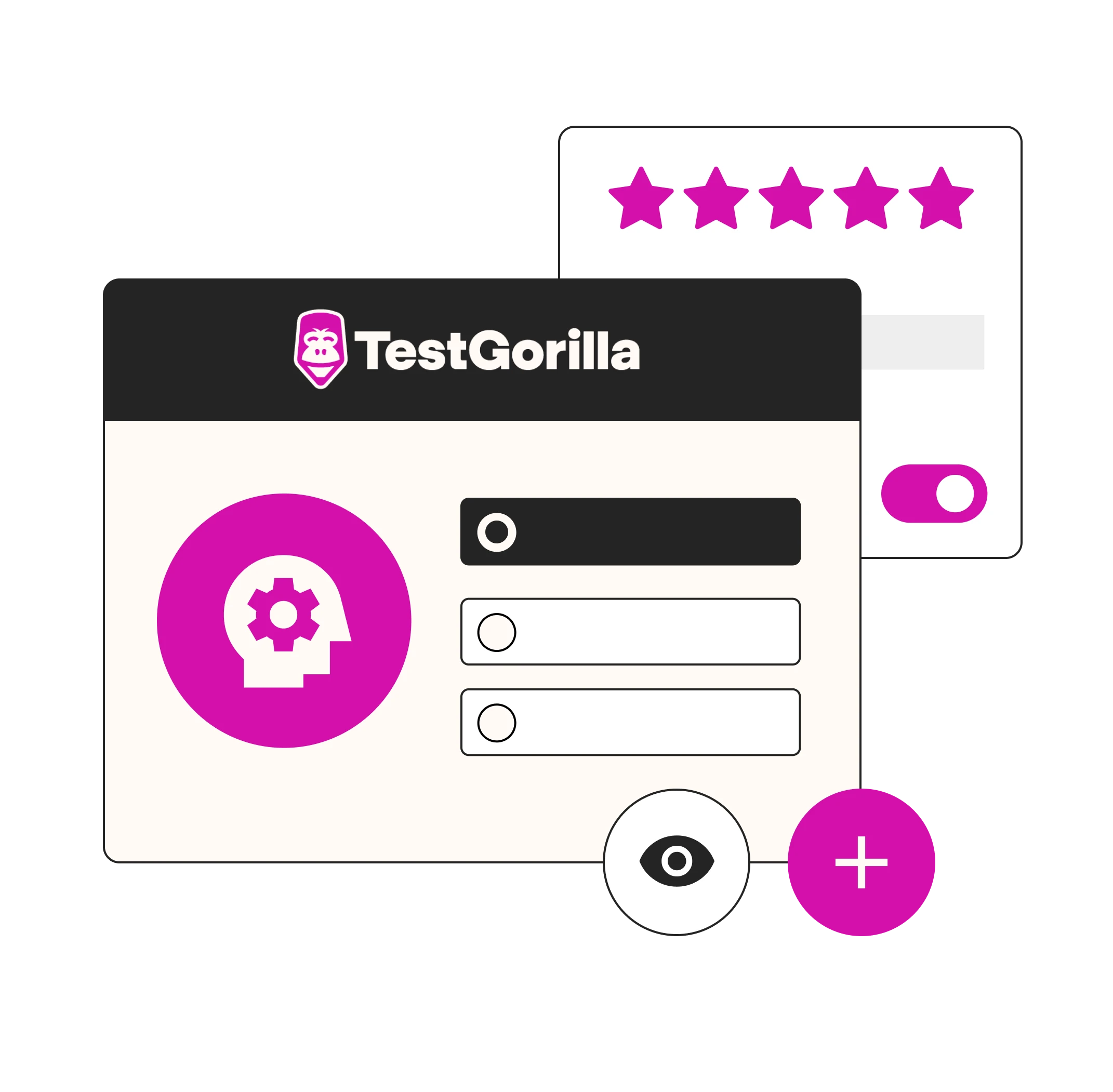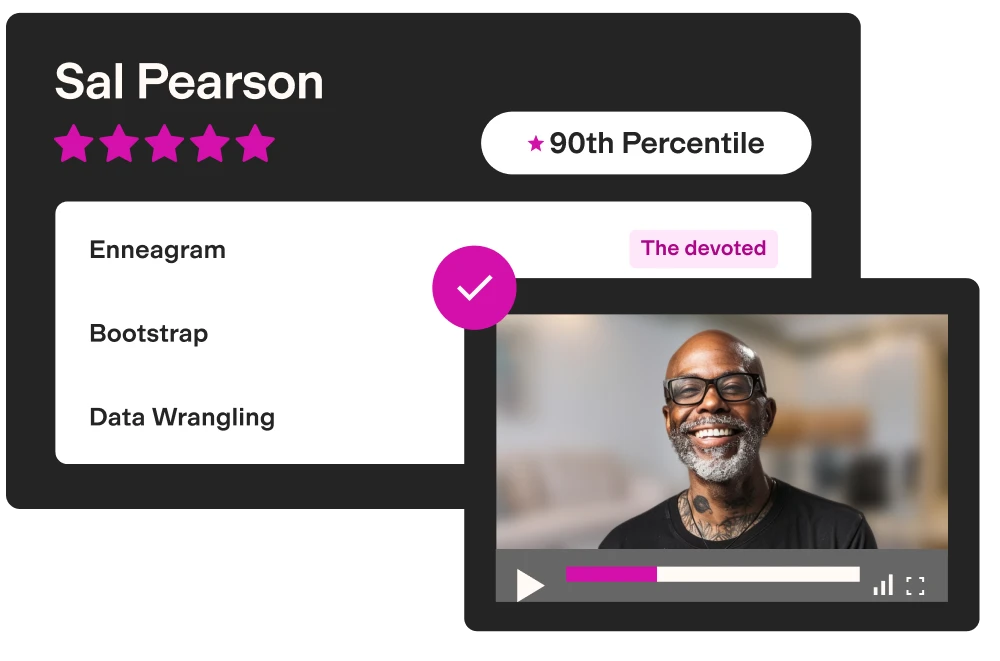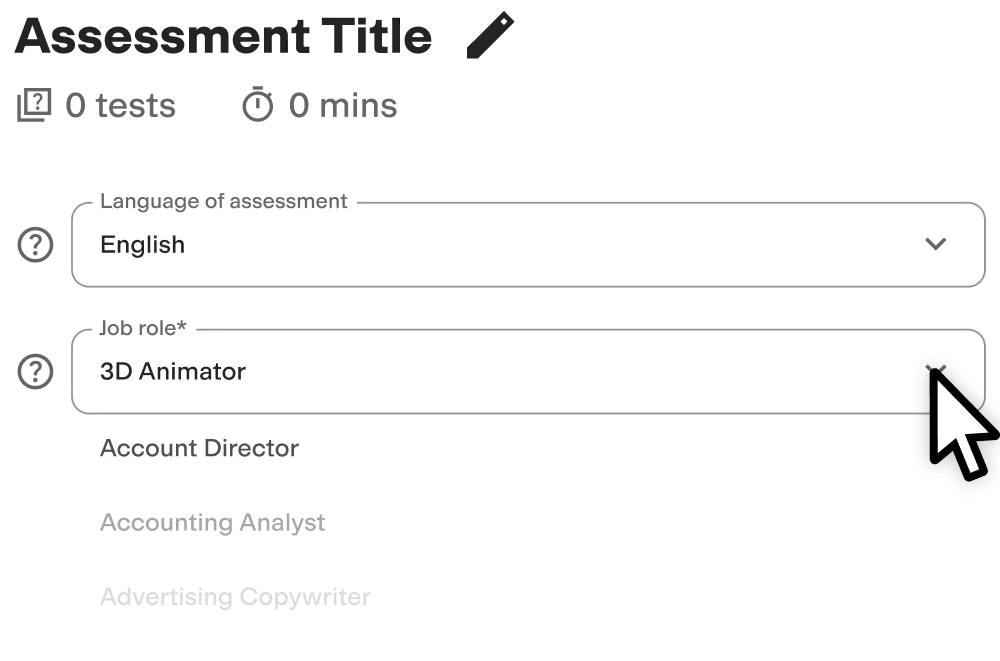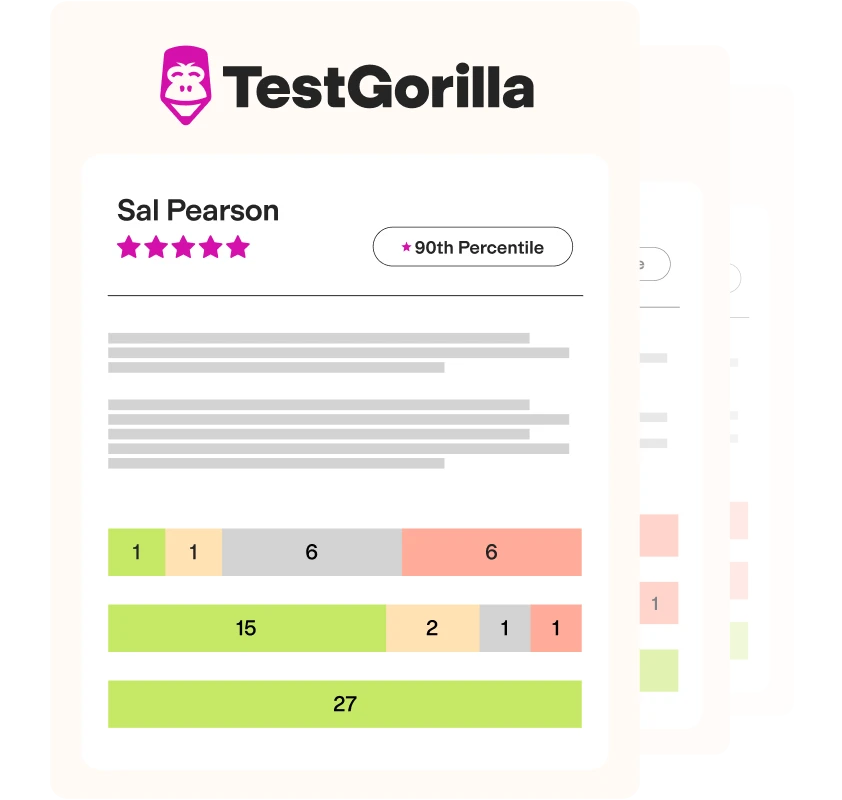Mechanical Reasoning test
Summary of the Mechanical Reasoning test
Our Mechanical Reasoning test (also known as a mechanical comprehension test) measures candidates’ understanding of basic physical and mechanical concepts. It helps you to identify people who can apply mechanical principles to solve problems.
Covered skills
Force and movement
Velocity
Pulleys, gears, and wheels
Use the Mechanical Reasoning practice test to hire
HVAC technicians, equipment installation technicians, electricians, welders, plumbers, carpenters, machine operators, machinists, automotive mechanics, engineers (mechanical, electrical, civil, facility maintenance, aerospace), and technical salespeople.
About the Mechanical Reasoning assessment test
Our Mechanical Reasoning test helps you assess candidates’ perception of physical forces and mechanical elements in practical situations.
It offers multiple-choice questions about real-world problems within a set time limit, and takers need to show their basic understanding of three physics and mechanics principles:
Force and movement
Velocity
Pulleys, gears, and wheels
For example, applicants might explore:
How force and velocity might affect certain systems and scenarios
How specific internal mechanisms work in practice
How to solve mechanical problems with simple engineering
These mechanical aptitude test questions explore how people mentally visualize and prepare for physical engineering tasks. It’s a great insight into how your candidates solve problems and reach the correct answers – which you can’t get from resumes alone.
Here are examples of candidates who perform well on Mechanical Reasoning tests:
Mechanical problem solvers; who are comfortable using complex equipment
Versatile engineers; who enjoy learning about how and why things work
Technical thinkers; who understand basic mechanical and physical principles
Preview questions from our Mechanical Reasoning test give you a clearer idea before you get started.
The test is made by a subject-matter expert
Raphael R.M.
Raphael loves all things Physics and Mathematics, especially teaching those topics to others. His degree in Mechanical Engineering and his years of experience in Physics (theoretical and applied) and Mathematics (advanced and applied) have equipped Raphael to teach these topics to students of all ages and levels of comprehension.
Raphael enjoys creating academic content of all kinds, including preparing educational materials and creating various types of assessments.
Crafted with expert knowledge
TestGorilla’s tests are created by subject matter experts. We assess potential subject-matter experts based on their knowledge, ability, and reputation. Before being published, each test is peer-reviewed by another expert, then calibrated using hundreds of test takers with relevant experience in the subject.
Our feedback mechanisms and unique algorithms allow our subject-matter experts to constantly improve their tests.
What our customers are saying
TestGorilla helps me to assess engineers rapidly. Creating assessments for different positions is easy due to pre-existing templates. You can create an assessment in less than 2 minutes. The interface is intuitive and it’s easy to visualize results per assessment.
VP of engineering, mid-market (51-1000 FTE)
Any tool can have functions—bells and whistles. Not every tool comes armed with staff passionate about making the user experience positive.
The TestGorilla team only offers useful insights to user challenges, they engage in conversation.
For instance, I recently asked a question about a Python test I intended to implement. Instead of receiving “oh, that test would work perfectly for your solution,” or, “at this time we’re thinking about implementing a solution that may or may not…” I received a direct and straightforward answer with additional thoughts to help shape the solution.
I hope that TestGorilla realizes the value proposition in their work is not only the platform but the type of support that’s provided.
For a bit of context—I am a diversity recruiter trying to create a platform that removes bias from the hiring process and encourages the discovery of new and unseen talent.
Chief Talent Connector, small business (50 or fewer FTE)
Use TestGorilla to hire the best faster, easier and bias-free
Our screening tests identify the best candidates and make your hiring decisions faster, easier, and bias-free.
Watch what TestGorilla can do for you
Create high-quality assessments, fast
Building assessments is a breeze with TestGorilla. Get started with these simple steps.
View a sample report
The Mechanical Reasoning test will be included in a PDF report along with the other tests from your assessment. You can easily download and share this report with colleagues and candidates.
Why are mechanical reasoning skills important to employers?
Employers rely on engineers and technicians with mechanical reasoning skills to build, maintain, repair, and upgrade products and facilities.
Without these mechanical skills, poorly maintained tools and machinery can slow down production. What’s more, they could produce faulty items or negatively affect services – putting customers at risk and damaging a company’s reputation.
Take a simple gear, for example. If installed incorrectly, it could result in the malfunction of a machine. However, not only is an engine's performance affected, but the mistake can also compromise users’ safety.
You can avoid this scenario completely when you hire with our online test for mechanical engineering jobs. You’re hiring top engineers based on their demonstrable skills – not merely their experience.
3 competencies to look for in our basic mechanical aptitude test for employers
Our Mechanical Reasoning test questions help you narrow down candidates based on three competencies:
Competency | Description |
Force and movement | Does your candidate understand how physical force can affect the stability and operation of tools, products, and machines? Do they know how to make adjustments so they’re functional and safe? |
Velocity | Can your applicant account for a product or feature’s speed and directional movement? Can they explain what happens when parts reach maximum velocity, and how to mitigate any related problems? |
Pulleys, gears, and wheels | Does your applicant understand how these basic objects and simple machines work in practice? Does your candidate know how to set up and adjust them? |
If you’re considering skills-based hiring for competencies such as these, use our recruitment ROI calculator to see how much time and money a mechanical reasoning practice test could save you.
What job roles can you hire with our Mechanical Reasoning aptitude test?
Our mechanical reasoning assessment test helps you measure skills that apply to various technical roles. Here are just a few positions where this type of reasoning is an important skill:
Engineers design, test, and operate complex mechanisms in specialties such as the civil and aerospace sectors
HVAC technicians maintain and fix complex equipment and know how to use a variety of tools to do so
Firefighters and emergency services use mechanical reasoning to safely gauge how to use tools, lift loads, and apply force to help get people to safety
Equipment installation technicians calculate how to safely install equipment with a detailed mechanical understanding of how it operates in practice
Electricians fix and maintain wiring, electrical circuits, and electrical equipment with deep mechanical knowledge of how they operate and the risks involved
Facility maintenance engineers visualize and solve complex technical and mechanical problems using a range of tools
Welders build and fix mechanical parts with an understanding of how they work in real life
Plumbers set up, fix, and maintain complex drainage and plumbing systems
Machinists use a variety of complex tools to safely complete tasks at speed
Technical salespeople sell technical products and services with confidence, knowing how internal parts work, their benefits, and how to troubleshoot them
Auto mechanics build and repair complex road vehicles, knowing how different parts work in motion and how risk factors apply
Carpenters design, build, and repair structures and fittings from detailed plans
Technical service providers like Orbit Technologies use skill assessments to help find and hire the best mechanical thinkers from a candidate pool.
In fact, since working with TestGorilla, the firm has boosted its new hire retention rate by 50%.
Create a multi-measure assessment: 4 tests to pair with the Mechanical Reasoning test
You can’t rely on a Mechanical Reasoning test alone to hire great candidates. We recommend assessing people with various technical and soft skill tests. That way, you have a clearer idea of how well-rounded your applicants are.
To help you, here are four different tests to use in a multi-measure assessment alongside our mechanical reasoning aptitude test:
Intermediate Math test: Assess candidates on calculus, general math principles, fractions, time estimates, and ratios
Attention to Detail test: Hire mechanical thinkers who can quickly identify errors, rigorously test products, and prioritize safety and compliance standards
Spatial Reasoning test: Measure your candidates’ ability to analyze and map out projects – and mentally rotate and fold elements while using visualization software
Structural Engineering test: Evaluate candidates’ understanding of structural basic principles such as dynamics, site planning, material selection process, and stability
You can discover more about how to assess mechanical engineering skills in our informative post.
Note: This example assessment includes our role-specific Structural Engineering test, which you can swap out if you wish. Feel free to explore our library for other role-specific skills tests more relevant to the positions you're hiring for.










